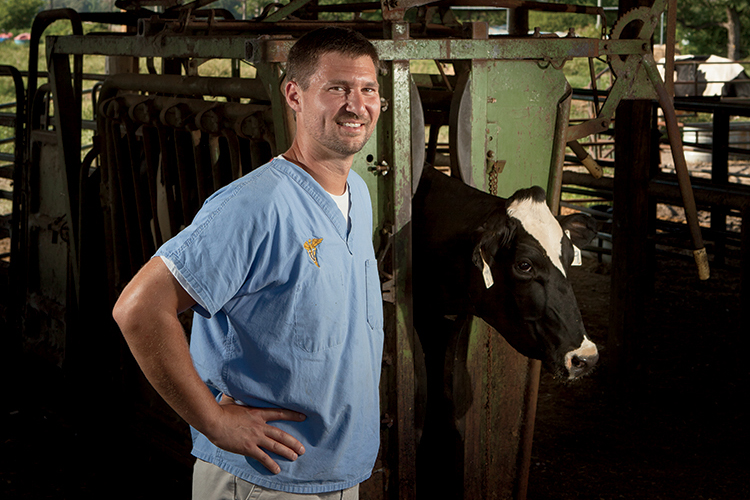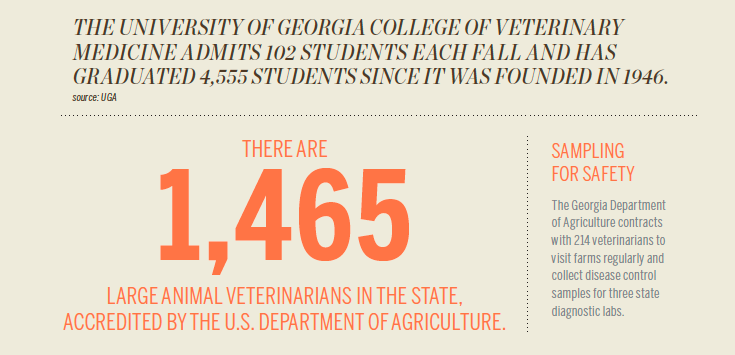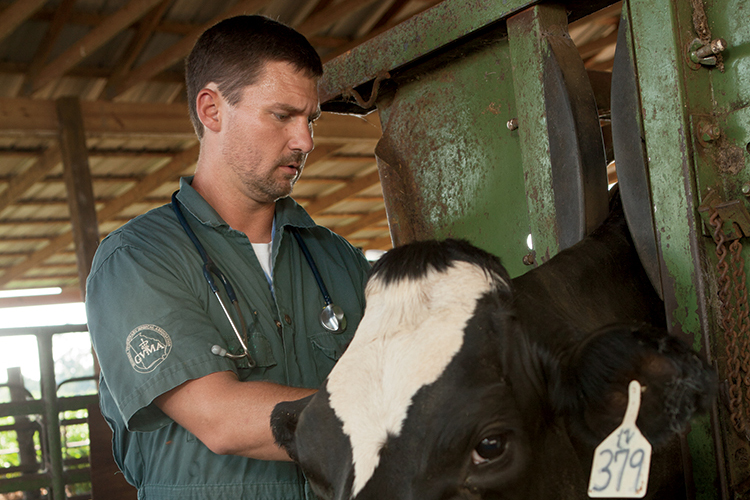Home > Georgia > Georgia Crops & Livestock > Georgia Veterinarians are First Responders
Georgia Veterinarians are First Responders

Back when Dr. Stephen Everett was a high school kid riding along in his boss’s truck for those late-night emergency farm calls, he didn’t mind staying up until the early hours. It was thrilling, important work, and he didn’t yet have a wife and two kids. Those experiences led him to partner with his former boss, Dr. Sam Evans, at Sandersville Veterinary Clinic, and today, his own son rides along with him on occasion. Working as a team, Everett and Evans continue the thrilling, important work, keeping farm animals healthy across 15 Georgia counties.
“Sometimes you might get a call an hour away from the clinic, and you get there and pull the calf, then you get a call two hours the other direction, so it can be a lot of driving. There can be some very long days,” Everett says, noting that it’s worth it. He feels like he’s making a difference in the community where he was raised. “We really help with the management on a lot of the operations we treat. Whether it just is simple herd health vaccinations, advice on nutrition or advice on reproduction, pretty much anything that can help our producer be as profitable as possible.”

It’s that collaborative relationship between Georgia’s veterinarians and producers that’s sometimes lost on the general public, and it’s a critical one to the state’s agricultural economy. Whether it’s keeping horses and llamas healthy for hobbyists or protecting public health by monitoring the state’s food animals, large animal veterinarians are the first responders of the animal world. There are 1,466 United States Department of Agriculture-accredited large animal veterinarians in the state, and the Georgia Department of Agriculture also contracts between 50 and 90 veterinarians to visit farms regularly and collect disease control samples for two state diagnostic labs.
“Veterinarians are very, very important to the animal industry in Georgia. They’re the first line of defense for us,” says State Veterinarian Dr. Robert Cobb. “We don’t have the staff and manpower to be out there in the field looking for all this on our own, so we’re very dependent on these veterinarians to be our eyes and ears.”
For Dr. Mark Zager of Blue Ridge’s Ocoee Animal Hospital, those 2 a.m.-in-a-thunderstorm breached-birth calls are as rewarding as the strategic herd health preventative care relationships he’s built with farmers during his nearly 40-year career. A 1979 graduate of University of Georgia College of Veterinary Medicine, Zager still relies on the cutting-edge research coming out of his alma mater.

“The veterinary school is a huge resource that I think a lot of people don’t realize. They have an open door and open phone policy, and I have the cellphone numbers of several professors,” Zager says. “We also refer animals to them, and they bring students out to experience what we do, too.”
Producers, animals and the veterinarians who serve them all drive Georgia’s agriculture forward, and Zager is proud to be part of the engine.
“The veterinarian and producer have to partner, and when they do that successfully, everybody comes out better,” Zager says. “It’s a win-win-win situation. The animals win because they’re healthier, the farmer wins because they’re more efficient and not spending money on sick animals or losing them, and the veterinarian is paid for his expertise. I’m grateful for such a rewarding career. It all works together.”



